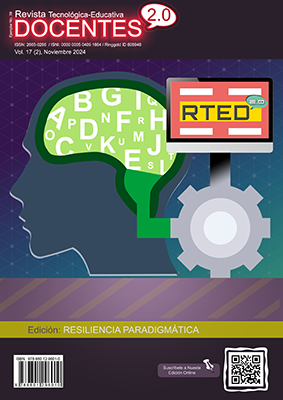The Artificial Intelligence Revolution in University Education: Advances, Perspectives, and Challenges in the Digital Age
 DOI:
https://doi.org/10.37843/rted.v17i2.539
DOI:
https://doi.org/10.37843/rted.v17i2.539
Main Article Content
Abstract
The digital era has generated an unprecedented transformation in higher education, positioning artificial intelligence (AI) as a fundamental protagonist in this change process. This essay examines the impact of this technology in higher education, considering its respective advantages and challenges. A qualitative approach and a descriptive narrative design are adopted, using a deductive method within a humanistic paradigm. The findings conclude that the tool can potentially optimize teaching and personalize learning, which could result in more efficient and accessible education. However, despite its potential, its effective integration requires conscious and ethical consideration. The literature reviewed suggests that AI can improve educational quality, making it imperative for a comprehensive analysis to ensure its effective contribution. The essay provides a balanced view, considering the ethical and practical implications of its use to ensure that it effectively contributes to the enrichment of the educational experience.
Downloads
Metrics
Article Details

This work is licensed under a Creative Commons Attribution-NonCommercial-NoDerivatives 4.0 International License.
Those authors who have publications in our journal accept the following terms:
- When a work is accepted for publication, the author retains rights of reproduction, distribution of his/her article for exploitation in all countries of the world in the format provided by our magazine and any other magnetic medium, optical, and digital.
- Authors will retain their copyright and guarantee the journal the right first to publish their work, which will be simultaneously subject to the Creative Commons Acknowledgment License (Attribution-NonCommercial-NoDerivatives 4.0 International (CC BY-NC-ND 4.0)). That allows third parties to copy and redistribute the material in any medium or format, under the following conditions: Acknowledgment - You must properly acknowledge authorship, provide a link to the license, and indicate if any changes have been made. You may do so in any reasonable way, but not in a way that suggests you have the licensor's endorsement or receive it for your use. NonCommercial - You may not use the material for a commercial purpose. NoDerivatives - If you remix, transform, or build from the material, you cannot broadcast the modified material. There are no additional restrictions - You cannot apply legal terms or technological measures that legally restrict you from doing what the license allows.
- Authors may adopt other non-exclusive license agreements to distribute the published version of the work (e.g., deposit it in an institutional archive or publish it in a monographic volume) provided that the initial publication in this journal is indicated.
- Authors are allowed and recommended to disseminate their work through the Internet (e.g., in institutional telematic archives, repositories, libraries, or their website), producing exciting exchanges and increasing the published work's citations.
- Request of withdrawal an article has to be done in writing by the author to the Editor, becoming effective after a written response from the Editor. For this purpose, the author or authors will send correspondence via e-mail: [email protected].
- The author will not receive financial compensation for the publication of his work.
- All Docentes 2.0 Journal publications are under the Open Journal System (OJS) platform at: https://ojs.docentes20.com/.
References
Aparicio Gómez, W. O. (2023). La Inteligencia Artificial y su Incidencia en la Educación: Transformando el Aprendizaje para el Siglo XXI. Revista Internacional de Pedagogía e Innovación Educativa, 3(2), 217–229. https://doi.org/10.51660/ripie.v3i2.133 DOI: https://doi.org/10.51660/ripie.v3i2.133
Benhamou, S. (2022). La transformación del trabajo y el empleo en la era de la inteligencia artificial: análisis, ejemplos e interrogantes. https://hdl.handle.net/11362/47985
Cope, B., Kalantzis, M., & Searsmith, D. (2020). Artificial intelligence for education: Knowledge and its assessment in AI-enabled learning ecologies. Educational Philosophy and Theory. 53. 1-17. 10.1080/00131857.2020.1728732. DOI: https://doi.org/10.1080/00131857.2020.1728732
Chen, L., Chen, P., & Lin, Z. (2020). Artificial intelligence in education: A review. Ieee Access, 8, 75264-75278. 10.1109/ACCESS.2020.2988510 DOI: https://doi.org/10.1109/ACCESS.2020.2988510
Hasanein, A. M., & Sobaih, A. E. E. (2023). Drivers and consequences of ChatGPT use in higher education: Key stakeholder perspectives. European Journal of Investigation in Health Psychology and Education, 13(11), 2599–2614. doi: 10.3390/ejihpe13110181 DOI: https://doi.org/10.3390/ejihpe13110181
Huerta-Presa, S., & Zavala-Ramírez, J. R. (2023). La Inteligencia Artificial y el Contexto de la Docencia en México. Revista Docentes 2.0, 16(1), 49–56. https://doi.org/10.37843/rted.v16i1.336 DOI: https://doi.org/10.37843/rted.v16i1.336
Igbokwe, I. C. (2023). Application of artificial intelligence (AI) in educational management. International Journal of Scientific and Research Publications (IJSRP), 13(3). https://doi.org/10.29322/ijsrp.13.03.2023.p13536 DOI: https://doi.org/10.29322/IJSRP.13.03.2023.p13536
Kim, J., & Park, C.-Y. (2020). Education, skill training, and lifelong learning in the era of technological revolution: a review. Asian-Pacific Economic Literature, 34(2), 3–19. DOI: https://doi.org/10.1111/apel.12299
Lahore, A. R., & Nazir, A. (2022). Economic Inequality and its Socio-Political Ramifications. Cosmic Journal of Social Sciences, 1(1), 27–35. https://n9.cl/a97bw
Louis, M., & ElAzab, M. (2023). Will AI replace teacher? International Journal of Internet Education, 22(2), 9–21. https://doi.org/10.21608/ijie.2023.312491 DOI: https://doi.org/10.21608/ijie.2023.312491
Luckin, R. (2018). Machine Learning and Human Intelligence: The future of education for the 21st century. UCL IOE Press
Minudri, T. (2023). Coursera announces new AI content and innovations to help HR and learning leaders drive organizational agility amid relentless disruption. [Coursera Blog]. https://n9.cl/nf75d
Padilla, R. D. M. (2019). La llegada de la inteligencia artificial a la educación. Revista de Investigación en Tecnologías de la Información: RITI, 7(14), 260-270. DOI: https://doi.org/10.36825/RITI.07.14.022
Selwyn, N., Hillman, T., Bergviken-Rensfeldt, A., & Perrotta, C. (2023). Making sense of the digital automation of education. Postdigital Science and Education, 5(1), 1-14. DOI: https://doi.org/10.1007/s42438-022-00362-9
Seo, K., Tang, J., Roll, I., et al. (2021). The impact of artificial intelligence on learner–instructor interaction in online learning. Int J Educ Technol High Educ, 18, 54. https://doi.org/10.1186/s41239-021-00292-9 DOI: https://doi.org/10.1186/s41239-021-00292-9
Visus, A. (2021). La revolución de la Inteligencia Artificial en la educación. ESIC. https://n9.cl/uo3ps
Vera, F. (2023). Integración de la Inteligencia Artificial en la Educación superior: Desafíos y oportunidades. Transformar, 4(1), 17–34. https://n9.cl/z65af
Xu, W., & Ouyang, F. (2022). The application of AI technologies in STEM education: a systematic review from 2011 to 2021. IJ STEM Ed, 9, 59. DOI: https://doi.org/10.1186/s40594-022-00377-5






